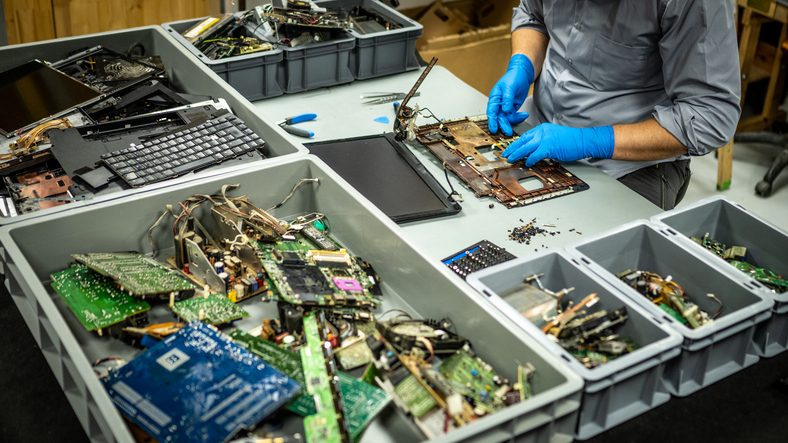Serving the Dallas Fort Worth Area & Nationwide

The Importance of Secure Hard Drive Destruction
In today’s digital age, sensitive information is stored on various devices, with hard drives being one of the most common storage mediums. Whether in personal computers, corporate servers, or data centers, hard drives contain a plethora of valuable data, including personal information, financial records, and proprietary business information. As technology evolves, so does the need to dispose of old hard drives securely. This article explores the risks associated with improper hard drive disposal, data security concerns, methods of destruction, environmental impacts, and the benefits of certified destruction services.
What are the Risks of Improper Hard Drive Disposal?
Improper disposal of hard drives can lead to numerous significant risks, primarily revolving around data breaches and identity theft. When hard drives are merely thrown away or recycled without proper destruction, they become easy targets for malicious actors who can recover the data stored on them. This oversight can result in several detrimental consequences.
First and foremost, data breaches pose a substantial threat. Unauthorized access to sensitive information can lead to severe financial losses, reputational damage, and legal repercussions for both individuals and organizations. The compromised data can include anything from personal identification details to confidential business records, making the fallout from such breaches potentially devastating.
Identity theft is another major risk associated with improper hard drive disposal. Personal information such as social security numbers, addresses, and bank details, if left unsecured, can be exploited for fraudulent activities. Malicious actors can use this information to commit various forms of fraud, causing long-term harm to the victim’s credit and personal finances.
Additionally, the improper disposal of hard drives opens the door to corporate espionage. Competitors or cybercriminals can gain access to proprietary business information, trade secrets, and intellectual property. Such breaches can undermine a company’s competitive edge, result in financial losses, and damage its reputation. The stakes are high, and the risks associated with improper hard drive disposal underscore the need for stringent data security measures and secure destruction methods.
What are the Data Security Concerns?
Data security is very important when disposing of hard drives. Ensuring that data is completely destroyed is necessary for several reasons. First, many industries have strict data protection regulations, such as GDPR, HIPAA, and CCPA, which require secure data destruction. These regulations are in place to protect personal and sensitive information from being misused or accessed without permission. Failure to comply with these regulations can result in severe penalties and legal consequences for businesses.
Second, organizations need to protect their clients’ and employees’ confidential information to maintain trust and avoid legal issues. Sensitive information, such as personal identification details, financial records, and proprietary business information, must be safeguarded to prevent it from falling into the wrong hands. A breach of this information can lead to significant financial loss, damage to reputation, and loss of customer trust.
Lastly, secure destruction prevents unauthorized access, ensuring that sensitive information does not fall into the wrong hands. When hard drives are not properly destroyed, they can be easily accessed by malicious actors who can exploit the data for various harmful activities, such as identity theft and corporate espionage. Proper destruction methods ensure that the data is irretrievable, reducing the risk of cyber-attacks and data breaches.
The Methods of Hard Drive Destruction
There are several ways to securely destroy hard drives, each with its own level of effectiveness and practicality. Physical destruction is one method, which includes shredding, crushing, or drilling holes into the hard drive to make it unusable. This method is very effective, but it requires specialized equipment. Another method is degaussing, which uses a powerful magnetic field to erase the data stored on the hard drive. While degaussing can work well, it may not be suitable for all types of drives, especially solid-state drives (SSDs). Lastly, data wiping is a software-based method that involves overwriting the data on the hard drive multiple times to ensure it cannot be recovered. This method works for both hard disk drives (HDDs) and SSDs, but it requires careful verification to ensure all data is completely removed.
What are the Environmental Impacts?
Improper disposal of hard drives can harm the environment in several ways. First, hard drives contain hazardous materials like lead, mercury, and cadmium, which can seep into the soil and water if not disposed of correctly. Second, many parts of hard drives can be recycled and reused. Secure destruction methods often include recycling, which helps reduce environmental impact. Lastly, making new hard drives uses a lot of energy and resources. By recycling and properly destroying old hard drives, we reduce the need for new materials, which helps protect the environment.
The Benefits of Certified Destruction Services
Using certified destruction services offers several advantages. First, they provide documentation and certificates of destruction, ensuring that you comply with data protection regulations and industry standards. Second, these services use specialized equipment and follow strict procedures to make sure hard drives are completely and securely destroyed. They also often include environmentally friendly practices, such as recycling and proper disposal of hazardous materials, which help protect the environment. Finally, knowing that professionals have securely destroyed your data gives you peace of mind, reducing the risk of data breaches and identity theft.
Call Secure On-Site Shredding
If you need reliable and secure destruction of your old hard drives and sensitive documents, Secure On-Site Shredding provides the best service to Dallas-Fort Worth and surrounding areas. When you rely on us for shredding hard drive services, you can rest easy knowing all the hard drives we receive are destroyed in accordance with the NAID AAA-certified guidelines. By following stringent protocols and ensuring our employees pass thorough background checks, we always take necessary steps to make sure your device and personal information stay secure. Whether you’re a business needing to comply with data protection regulations or an individual seeking to protect your personal information, we have you covered. Don’t leave your data security to chance. Trust Secure On-Site Shredding for efficient, eco-friendly, and compliant destruction services. Contact us today to schedule your shredding appointment.





